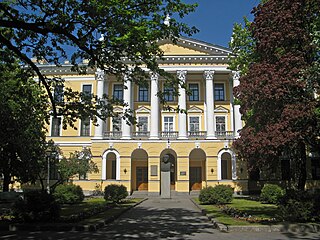Related Research Articles

Valentin Sergeyevich Pavlov was a Soviet official who became a Russian banker following the dissolution of the Soviet Union. Born in the city of Moscow, then part of the Russian Soviet Federative Socialist Republic, Pavlov began his political career in the Ministry of Finance in 1959. Later, during the Brezhnev Era, he became head of the Financial Department of the State Planning Committee. Pavlov was appointed to the post of Chairman of the State Committee on Prices during the Gorbachev Era, and later became Minister of Finance in Nikolai Ryzhkov's second government. He went on to succeed Ryzhkov as head of government in the newly established post of Prime Minister of the Soviet Union.
A People's Commissariat was a structure in the Soviet state from 1917–1946 which functioned as the central executive body in charge of managing a particular field of state activity or a separate sector of the national economy; analogue of the ministry. As a rule, a People's Commissariat was headed by a People's Commissar, which is part of the government – the Council of People's Commissars of the appropriate level.

The Directorate, or Directory was a provisional collegiate revolutionary state committee of the Ukrainian People's Republic, initially formed on 13–14 November 1918 during a session of the Ukrainian National Union in rebellion against the Ukrainian State. During the Anti-Hetman Uprising it was named as the Executive Council of the State Affairs. Its authority was extended by the Labor Congress of Ukraine on 23–28 January 1919.

Nikolai Pavlovich Bryukhanov was a Russian Bolshevik, Soviet statesman and political figure who served as People's Commissar of Finance between 1926 and 1930. Until recently, his date of death was believed to have been June 30, 1943.

VTB Bank is a Russian majority state-owned bank headquartered in various federal districts of Russia; its legal address is registered in St. Petersburg. As of 2022, the company's capital stock was mostly owned by three Russian agencies.

The State Bank of the Russian Empire was the dominant financial institution of the Russian Empire from its founding in 1860 until the Empire's end in 1917. A public bank headquartered in Saint Petersburg, it initially coexisted within the Empire with the Bank Polski until the latter was deprived of its residual monetary role in 1870, and with the Bank of Finland which soon defined a separate monetary zone for the Finnish markka. In 1897, with the Russian adoption of the gold standard, the State Bank fully took the attributes of a central bank, while keeping a significant additional role of commercial and development lending that made it the main source of credit to the Russian economy.

VEB.RF, or VEB, is a Russian state development corporation and investment company. It was founded in 2007 as a development institute. It has financed more than 300 projects.
IPJSC Ingosstrakh is one of the major insurance companies of Russia, as well as a public joint-stock company. Headquartered in Moscow, Ingosstrakh is the legal successor of the Chief Agency of Foreign Insurance of the USSR, founded in 1947. In 1972, it transformed into a stock company with 100% government shares. It went private in 1992.

Moscow Narodny Bank Limited (MNB), London was created as an independent bank in October 1919 on the basis of the London branch or Mosnarbank (London) of the Moscow Narodny Bank, which had operated in London since 1915.

People's Commissariat for Posts and Telegraphs of the RSFSR, known shortly as the Narkompochtel, was the central organ of government of the RSFSR that was in charge of the organisation and development of the different forms of communication, including postal service. It was founded in Petrograd on 7 November [O.S. 25 October] 1917 from the Russian Ministry of Posts and Telegraphs and retained its organisational structure.

Following the October Revolution, Vladimir Lenin became the head of the new government of the Russian Soviet Federative Socialist Republic. It was known officially as the Council of People's Commissars, effectively his cabinet. Ten of the council's fourteen members would later be killed during Joseph Stalin's Great Purge.

The Council of People's Commissars of the Russian Soviet Federative Socialist Republic was the government of Soviet Russia between 1917 and 1946. It was established by the Second All-Russian Congress of Soviets of Workers', Soldiers', and Peasants' Deputies on November 9, 1917 "as an interim workers' and peasants' government" under the name of the Council of People's Commissars, which was used before the adoption of the Constitution of the Russian Socialist Federative Soviet Republic of 1918.

Hyperinflation in early Soviet Russia connotes a seven-year period of uncontrollable spiraling inflation in the early Soviet Union, running from the earliest days of the Bolshevik Revolution in November 1917 to the reestablishment of the gold standard with the introduction of the chervonets as part of the New Economic Policy. The inflationary crisis effectively ended in March 1924 with the introduction of the so-called "gold ruble" as the country's standard currency.

A kolkhoz was a form of collective farm in the Soviet Union. Kolkhozes existed along with state farms or sovkhoz. These were the two components of the socialized farm sector that began to emerge in Soviet agriculture after the October Revolution of 1917, as an antithesis both to the feudal structure of impoverished serfdom and aristocratic landlords and to individual or family farming.

The Government of Bashkortostan is a governing body of Bashkortostan in Russia which exercises executive power under the authority of the Republic Head whom appoints cabinet which is composed of the Prime Minister, the deputy prime ministers, and the ministers that are approved by the governing legislature is the State Assembly.

Promsvyazbank PJSC is a state-owned, formerly private Russian bank from Moscow. It was owned by oligarchs Dmitry Ananyev and his brother Alexei Ananyev. As of 2012, it was the 10th-largest bank in Russia by assets.

The Second All-Russian Congress of Soviets of Workers' and Soldiers' Deputies was held on November 7–9, 1917, in Smolny, Petrograd. It was convened under the pressure of the Bolsheviks on the All-Russian Central Executive Committee of the First Congress of Soviets of Workers' and Soldiers' Deputies.
Yury Valentinovich Ponomaryov is a Russian banker, chairman of the board of directors of Moscow Narodny Bank (1998–1999) and president and chairman of Vneshtorgbank (1999–2002).

East-West United Bank is a bank based in Luxembourg, established on 12 June 1974 by the Gosbank, the Soviet Union's central bank. It has been fully owned by Russia-based Sistema since 2018. The bank offered private banking and corporate financing. Since the Russian invasion of Ukraine in February 2022 the bank has had to surmount many problems. Unable to sell the business, Sistema took the decision in late 2023 to close the bank.
The Soviet Union was the first jurisdiction to implement a single-tier banking system, an experience that was subsequently emulated by a number of Communist states.
References
- 1 2 Хрестоматия по истории СССР. 1861—1917 — М.: Просвещение, 1990. С. 386—388
- ↑ Устав Московского народного банка, 1913, С. 3
- ↑ "Энциклопедия Российского купечества". www.okipr.ru. Retrieved 2019-10-21.
- ↑ "Московский народный банк". Банки.ру. Retrieved 2019-10-16.